Winter 2022-23 will be the first since the pandemic started where there are no health-related travel restrictions between Canada and the United States, and B.C. ski resorts are eager for a banner rebound season.
But local tourism officials also remain somewhat in the dark because while several factors make B.C.’s ski hills more attractive than ever to foreign visitors, there are so many variables at play that no one knows for sure how the winter tourism season will go.
“I think the next story [for B.C. ski resorts] might be when we come out of this winter season, to see how did it actually resolve itself versus what we think it’s going to happen, given we are in the first full-year cycle [after border restrictions are lifted],” said Tourism Vancouver president and CEO Royce Chwin.
So far, 2022 has been good to the tourism industry in B.C., with high hotel occupancy rates, attendance numbers at attractions and cruise ship counts over the summer months. Experts attributed those results to pent-up demand that was released as leisure travel reopened, and many are anticipating the same momentum carrying through to the winter.
Industry metrics this year showed that – other than Asian countries being still under some form of travel restrictions until this month, when Japan and Taiwan reopened their doors – strong recoveries from markets like Great Britain and Mexico combined with continued stronger-than-usual domestic travel within Canada.
But because visitor counts from the United States have remained slow to recover, many officials are now focusing their winter-tourism efforts there.
“This month, Destination BC launched ‘You, Elevated’: A new ski consumer marketing campaign in Washington and California aimed at raising the awareness of the B.C. ski experience, and driving skiers to book a ski trip to B.C. this winter,” a statement from the provincial tourism agency said, noting that those two states are the top market sources for American skiers visiting the province.
These strategies and focus points are mostly echoed by top ski resorts outside of Metro Vancouver. Lower Mainland resorts like Grouse Mountain and Cypress Mountain rely heavily on local urban traffic.
Vail Resorts’ (NYSE:MTN) Whistler Blackcomb, for instance, said it’s leaning on its renowned reputation and executing marketing campaigns not only in the United States but also in places like Great Britain and Australia. Visitor volume this year, a resort spokeswoman said, should “mirror pre-pandemic levels.”
For Big White Ski Resort, 62 kilometres east of Kelowna, about seven per cent of its skier visits pre-pandemic were from the United States.
Michael J. Ballingall, senior-vice president at the resort, said early signs are good for a recovery: New Year’s weekend is already fully booked, and more bookings are expected to pick up in other time periods such as Christmas.
“If the snow is good, we expect that U.S.A. Presidents’ Week [in February], spring break and Easter will be busy with American guests,” Ballingall said. “Our bookings out of Washington state and Oregon are up substantially over last year.”
Vernon’s SilverStar Mountain resort does not break down visitor counts from each country, but communications manager Chantelle Deacon said international visitors traditionally account for 25 per cent of its business.
She noted that while SilverStar is excited in anticipating the return of international travellers, there’s also hope that the resort can simultaneously keep the higher-than-usual number of Canadian domestic skiers who discovered B.C. skiing due to travel restrictions.
“This is the first year since the pre-pandemic times that we’re planning a completely normal year again,” Deacon said. “Last year, we definitely did not have as many of our international guests here.… But when the pandemic started, we saw a huge influx of people within Canada travelling to a resort that they’ve never been to before, and that lessened the impact of the pandemic.”
Early signs are good, she added. January and February are fully booked, while March and early December still have availability.
“It’s one of the busiest January and February we’ve seen,” Deacon said. “What we can say right now is we’re off to a great start. We are hoping that the snow keeps up throughout the winter and the holidays.”
Destination BC officials added that they are also optimistic because of the weaker Canadian dollar, which may encourage U.S. skiers to visit B.C.
Destination Vancouver’s Chwin said he is happy to hear the positive early returns from B.C. ski resorts. He noted that skiing is extraordinarily important for the region’s tourism sector because it provides a reliable source of business in the winter – typically a “shoulder season” where traditional tourism activity is lower.
However, Chwin also noted that a lower Canadian dollar has not typically been a driver for American tourists coming to Canada. He said it usually drives Canadian tourists south. Chwin also noted that inflation and other ongoing economic challenges might change some people’s vacation plans. He pointed out that, while the Canada-U.S. border opening allows foreign visitors to come to Canada more easily, it also accelerates the reverse flow of Canadian tourists going abroad.
He said that’s why it’s crucial for Destination BC and other groups to focus on attracting tourists from nearby states like Washington and California. It plays on what is one of the key draws for American tourists: Familiarity.
“Vancouver and B.C. make for a great and convenient option for a vacation,” Chwin said. “The one consideration tourists have is convenience and frictionless travel, and Vancouver offers that option.
“But how this season will go, I think will be interesting. We don’t really know. Our forecasts suggest we’ll see a lot of what we’ve been seeing over the summer, and that’s a lot of visitation driven by Canadians and locals, will less trans-border or international visitors.”
According to Destination BC, skiing accounts for roughly 13 per cent of B.C.’s tourism GDP and is “the single largest niche or passion activity represented in B.C. in the recreation/leisure sector.”



